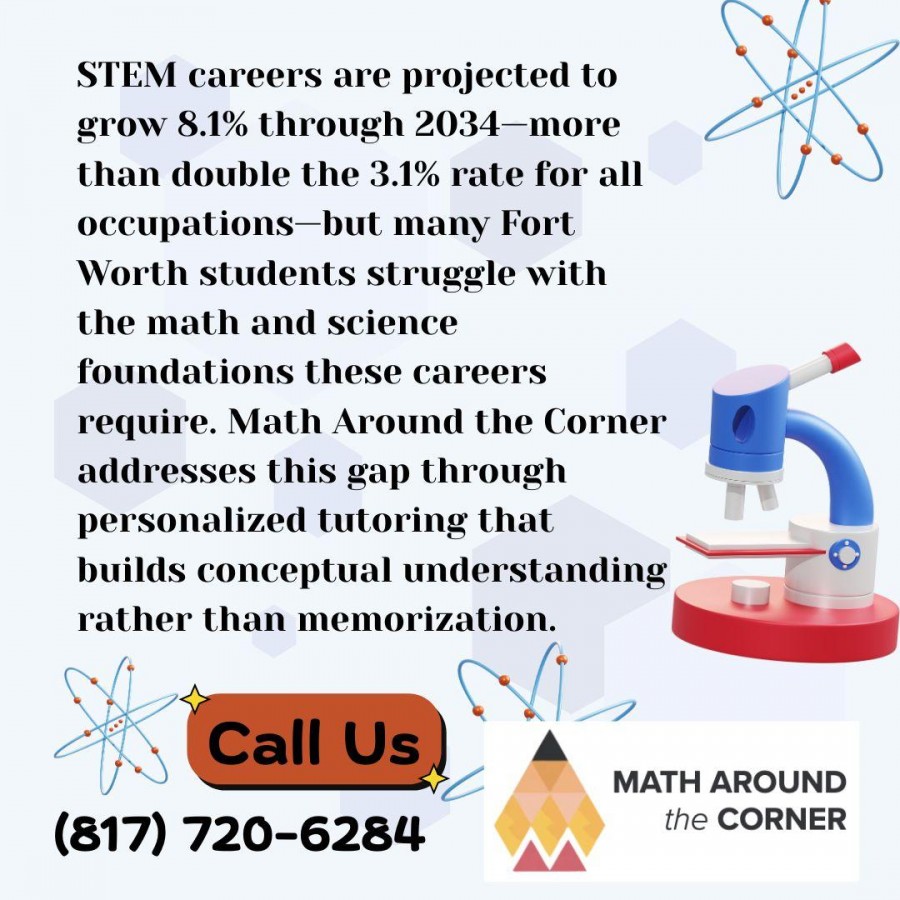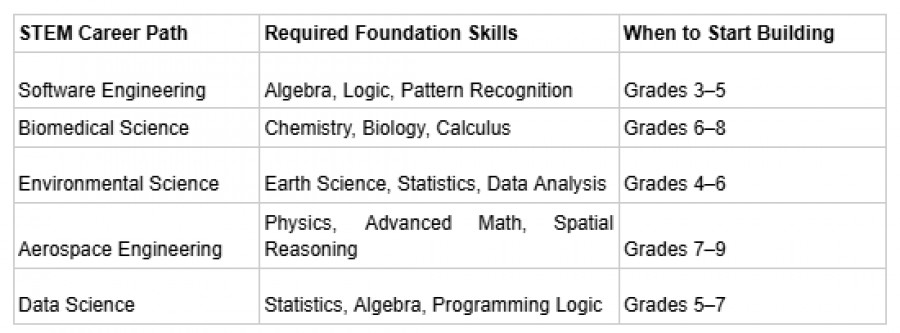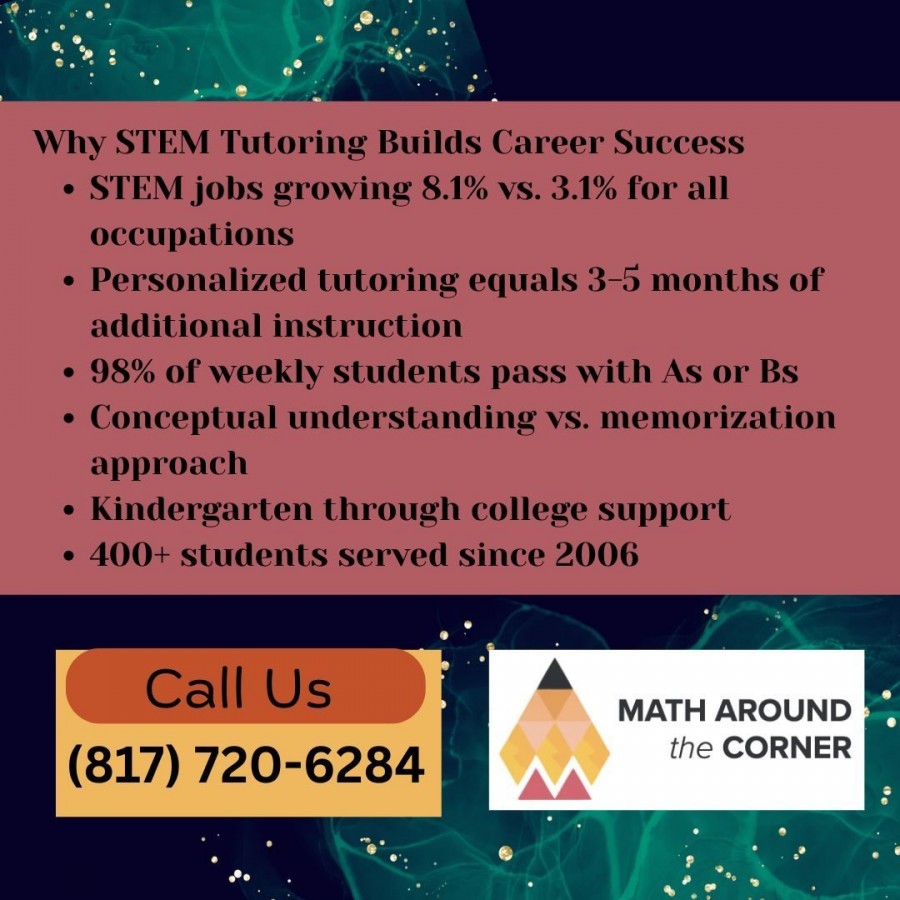Building Tomorrow's Innovators: How Math and Science Tutors Shape STEM Careers

At Math Around the Corner, we see this every day - students who receive personalized tutoring in math and science are 2.5 times more likely to pursue STEM degrees in college. This single statistic reveals why parents across Fort Worth and the DFW metroplex are investing in quality math and science tutors for their children. The foundation you build today directly impacts your child's future career opportunities in fields that will define the next generation.
STEM careers now represent some of the fastest-growing and highest-paying professions in the United States. From biomedical engineering to data science, these fields require strong mathematical and scientific foundations that begin forming in elementary school. The question isn't whether STEM education matters, but how you can position your child for success in these high-demand careers.
Key Takeaways
Students who work with math and science tutors are 2.5 times more likely to pursue STEM degrees, making personalized tutoring a powerful investment in your child's future career opportunities.
Early intervention matters most. Students who fall behind in math by third grade face lifelong academic challenges, but a tutor for maths and science can close gaps before they widen.
One-on-one tutoring outperforms group STEM learning programs by adapting to each student's specific learning style, pace, and knowledge gaps with immediate, personalized feedback.
Confidence shapes career paths more than ability. Children who develop math and science confidence in elementary school are far more likely to pursue high-demand STEM careers, regardless of natural talent.
Effective STEM learning strategies start at home. Parents who normalize struggle, ask "how" and "why" questions, and connect tutoring math and science concepts to daily life accelerate their child's progress and engagement.

How Does Tutoring Help Students in STEM Subjects?
One-on-one tutoring accelerates learning by addressing individual knowledge gaps that classroom instruction often misses. While group settings teach to the middle, a tutor for maths and science adapts to your child's specific learning style, pace, and areas of struggle.
According to research from the National Bureau of Economic Research, students who received high-dosage tutoring showed learning gains equivalent to three to five additional months of instruction. These gains compound over time. When a student masters fractions in fourth grade rather than struggling through to sixth grade, they enter algebra with confidence instead of anxiety.
Math and science tutors identify the exact moment understanding breaks down. Perhaps your child memorized formulas without grasping underlying concepts. Maybe they missed a week of school during a critical unit. A skilled tutor pinpoints these gaps and rebuilds the foundation before adding new material.
Actionable Pointer for Parents:
Track your child's test scores and homework patterns. If you notice consistent struggles with specific topics (like word problems or chemical equations), that's your signal to seek targeted support. Early intervention prevents small gaps from becoming major obstacles.
What Skills Do Students Need for STEM Careers?
STEM careers require three core competencies: analytical thinking, problem-solving persistence, and the ability to apply theoretical knowledge to real-world situations. These skills develop through years of practice, not overnight.
Consider the pathway to becoming a biomedical engineer. Students need calculus for modeling biological systems, chemistry for understanding molecular interactions, and physics for designing medical devices. But beyond content knowledge, they need the confidence to tackle complex problems without giving up when the solution isn't immediate.
Quality STEM learning programs build this persistence by creating safe environments for struggle. When students work through challenging problems with supportive guidance, they develop what psychologists call "productive failure." They learn that confusion is part of learning, not evidence of inability.

The table above shows when students should begin building foundational skills for different STEM paths. Notice how early the preparation begins. By the time students declare a college major, they've been building relevant skills for nearly a decade.
Actionable Pointer for Students:
Choose one STEM topic that fascinates you and go deeper than your class requires. If you love astronomy, learn the orbital mechanics behind planetary motion. If coding interests you, build a simple app. Depth in one area often illuminates connections across all STEM subjects.
When Should Students Start STEM Tutoring?
The ideal time to begin tutoring is when your child first shows signs of struggle, not after grades have already dropped. Math Around the Corner works with students from kindergarten through college because early intervention prevents the anxiety and avoidance that plague many students in later years.
According to the National Center for Education Statistics (NCES), students who fall behind in math by third grade are significantly less likely to graduate high school. The achievement gap widens each year, making catch-up increasingly difficult. Starting support early keeps students on track rather than requiring remediation later.
However, it's never too late. High school students preparing for the SAT math sections or college students struggling with calculus can still benefit tremendously from targeted support. The key is personalized instruction that meets students where they are.
Carol Bearden, founder of Math Around the Corner, built her Fort Worth tutoring practice on this principle. Starting with a single sixth-grader struggling in math, she watched the student's average climb from failing to an A. More importantly, she witnessed the transformation in confidence that came with understanding. That student didn't just improve her grade; she changed her relationship with learning itself.
Actionable Pointer for Parents:
Don't wait for failing grades. If your child says, "I'm just not a math person," or avoids homework in certain subjects, these are early warning signs. Beliefs about ability often matter more than actual ability in determining long-term outcomes.
How Can Parents Support STEM Learning at Home?
Parents who normalize struggle and celebrate problem-solving effort create environments where STEM thinking flourishes. You don't need a science degree to support your child's STEM development. You need the right mindset and strategies.
Start by changing the language around mistakes. Instead of "That's wrong," try "What made you think that?" or "Let's figure out where the thinking shifted." These phrases frame errors as learning opportunities rather than failures. Students who fear being wrong never take the intellectual risks that lead to deep understanding.
Incorporate STEM thinking into daily life. Cooking involves chemistry and measurement. Budgeting requires percentages and algebra. Planning a road trip uses distance, rate, and time calculations. When children see how math and science explain the world around them, these subjects transform from abstract school requirements into practical tools.
STEM Learning Strategies for Home:
Ask "how" and "why" instead of "what": Questions that require explanation deepen understanding
Encourage multiple solution methods: Show that problems often have several valid approaches
Make mistakes visible: Share times you struggled with math or science and how you worked through it
Connect learning to interests: Use sports statistics, video game design, or cooking to teach concepts
Set aside dedicated time: Even 20 minutes of focused practice daily outperforms marathon cram sessions
The boutique approach taken by locally-owned tutoring services like ours, Math Around the Corner, reflects these principles. With extended hours (9 AM to 10 PM on weekdays) and both in-home and virtual options, families can access support that fits their schedules. This flexibility removes barriers that prevent consistent practice.
How Does One-on-One Tutoring Differ from Group STEM Programs?
Individual tutoring provides personalized pacing, immediate feedback, and customized examples that group programs cannot match. While group STEM learning programs offer value through peer interaction, they cannot address the specific misconceptions each student holds.
Think about learning to play piano. Group classes teach everyone the same songs at the same pace. Private lessons allow the instructor to focus on your specific challenges, whether that's rhythm, finger placement, or reading music. The same principle applies to tutoring math and science.
In a one-on-one setting, tutors notice when students nod along without truly understanding. They catch subtle signs of confusion before they become entrenched. They adjust explanations on the fly based on what resonates with each individual learner. This responsiveness accelerates progress in ways that a standardized curriculum cannot.
Math Around the Corner's 98% success rate (students attending weekly sessions pass with an A or B) demonstrates what personalized attention achieves. This isn't about teaching gifted students; it's about meeting each student's specific needs consistently over time.
Actionable Pointer for Students:
Come to tutoring sessions with specific questions. Instead of "I don't get chapter 5," say "I understand how to set up the equation, but I'm confused about which operation to do first." Specific questions help tutors target exactly what you need.

What's the Connection Between Early Math Confidence and Career Choices?
Students who develop confidence in math and science during elementary and middle school are significantly more likely to pursue STEM careers, regardless of innate ability. Confidence shapes course selection, which determines college majors, which influences career paths. The trajectory starts earlier than most parents realize.
A student who feels capable in algebra signs up for advanced math courses in high school. Those courses open doors to engineering and science programs in college. A student who doubts their math ability avoids advanced courses, closing off entire career categories before they've even researched them.
This pattern disproportionately affects certain demographics. Women and underrepresented minorities often receive subtle messages that STEM isn't "for them," despite having equal capability. Quality tutoring interrupts these narratives by providing evidence of capability through actual mastery.
The role of a math and science tutor extends beyond content delivery. Tutors serve as mentors who model enthusiasm for STEM subjects. They share their own learning journeys, including struggles and breakthroughs. They connect abstract concepts to real applications, helping students envision themselves in STEM careers.
Building a STEM Mindset:
Celebrate effort over outcomes initially
Break complex problems into manageable steps
Use visual representations to support abstract thinking
Connect new concepts to previously mastered material
Maintain consistent practice schedules
Seek help early when confusion arises
Participate in STEM competitions or clubs
These strategies work because they address both skill development and identity formation. Students begin seeing themselves as "people who can do math" rather than "people who can't."
Take the Next Step in Your Child's STEM Journey
Your child’s future success in STEM fields starts with the foundation you help them build today. Whether your child is struggling to keep up, working at grade level, or ready for acceleration, personalized support adapts to their needs in ways classroom instruction cannot.
At Math Around the Corner, we’ve spent nearly two decades helping Fort Worth students strengthen the math and science skills that open doors to top-tier colleges and rewarding careers. Our one-on-one approach identifies exactly where each student needs support and builds from there, step by step, concept by concept.
Ready to see your child gain confidence and excel in math and science? Call us at (817) 720-6284 or email hello@matharoundthecorner.com to discuss how customized tutoring can support your child’s academic goals. We proudly serve Fort Worth, Dallas, and the surrounding DFW areas with flexible scheduling and both in-home and virtual sessions.
Success in every subject starts with the right support at the right time.
